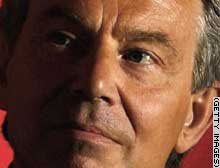|
|
Home | Asia | Europe | U.S. | World | Business | Tech | Science | Entertainment | Sport | Travel | Weather | Specials | Video | I-Reports |
|
|
|
Home | Asia | Europe | U.S. | World | Business | Tech | Science | Entertainment | Sport | Travel | Weather | Specials | Video | I-Reports |
|

By CNN European Political Editor Robin Oakley Adjust font size:
LONDON, England (CNN) -- All political careers, it is said, end in tears. Tony Blair leaves office with his reputation clouded by the disastrous outcome of the Iraq war and the "Cash for Honors" scandal, which could yet see some of those close to him charged with criminal offences. A decade on, historians may take a kinder view. Blair may be quitting at a time when his Labor Party has just lost control of Scotland for the first time in 50 years and suffered setbacks too in local elections in England and Wales. But he was the only leader ever to win three successive elections for the Labor Party, the third of those successes coming after the Iraq war. And in the very week of his expected departure announcement we have seen the astonishing climax of his 10 years of work for peace in Northern Ireland with Protestant Unionism's most intractable voice, the DUP leader Ian Paisley, and Sinn Fein's Martin McGuinness, a former IRA commander, swearing in together in a power-sharing executive. Blair can list on his credit ledger too the devolution measures which gave Scotland a Parliament and Wales its own legislative assembly. The swift granting of independence to the Bank of England to set interest rates without political interference has helped to eliminate the previous stop-go swings of the British economy. An unprecedented period of sustained growth and low unemployment has been accompanied by the introduction of a national minimum wage. Not only has Blair turned Labour into a party of government, he has shifted the terms of political debate in Britain. Just as Margaret Thatcher's success drove the Labour Party to the right, his relentless occupation of the political center ground has forced his Conservative opponents under David Cameron to move left and accept the virtues of effective public spending. There have though been significant failures too. Obsessed after Labour's 18 years in opposition with winning a second election Blair concedes now that he was too hesitant about public service reforms in his first Parliament, too limited in his commitments for the second term. He only fully understood how to use power in his third term, by which time his authority and popularity were waning and his majority was smaller. He failed in his ambition to remove British suspicions of the European Union and take his country into the Single European Currency -- the last option firmly blocked by his finance minister and expected successor Gordon Brown. Why had Tony Blair become so unpopular that his own party forced him out before the "full third term" that he had originally intended to serve? In a word, Iraq. But not just because of the disastrous consequences of the invasion. Polls confirm that the British people now feel more at risk from terrorism than they did before the invasion, despite a raft of draconian anti-terrorism legislation which has seriously eroded British liberties. Blair's decision to enter the war provoked the biggest demonstrations ever seen in Britain. And the way in which he made the case for war, claiming erroneously that Saddam Hussein had weapons of mass destruction, lost him public trust with two-thirds of the British public saying they no longer believed him. The inquiries he was forced to concede after the suicide of weapons scientist David Kelly, who had been named as the source of allegations the British government had "sexed up" its anti-Saddam dossier, revealed the inner workings of government as never before, exposing 10 Downing Street's already suspected obsession with spin and media manipulation. Sometimes this verged on the absurd. I was doing a story once on the British bid for the next World Cup, working with the sports minister. The next thing I knew, to the minister's amazement, he and I had been invited, with camera, to a meeting in the Downing Street garden with Blair and a Football Association official. Even a ball was provided. All that was missing was a referee and canned applause. Tony Blair has been the best political communicator of my years reporting politics, a man capable like no other of shaping and articulating the public mood, as in the famous "She was the people's princess" response to the death of Diana, Princess of Wales. He deserves credit for opening up Downing Street to regular on the record press conferences, never ducking them at difficult times. Few politicians have been as coolly in control or courteous with a rumbustious media. But even if the "Cash for Honors" scandal was about finding funds for political activity, not enriching individuals, like some of the episodes under the Conservative government which he had castigated as sleaze, Blair has failed to clean up public life as he had promised and he has lessened respect for the political process. For a man with a strong moral streak that is something which will continue to sting in his retirement.  Tony Blair was the only leader ever to win three successive elections for the Labor Party, the third of those successes coming after the Iraq war. I-REPORT
I-REPORTBrowse/Search
VIDEOQUICK VOTE |